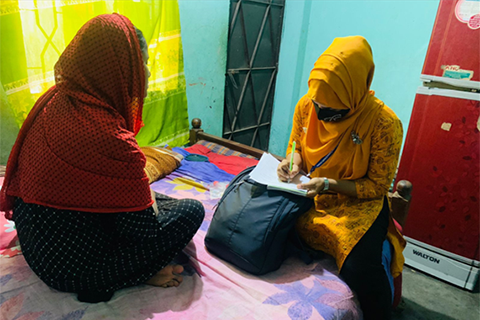09 September 2024
Issue 33
Transmission study of antimicrobial resistance

Participant registration by trained study staff in their home
Pregnant women, as part of the immunocompromised population, are especially susceptible to bacterial infections. ESBL carriage during pregnancy can lead to life-threatening urinary tract infections, potentially affecting newborns due to fecal-vaginal transmission (Denkel et al., 2014; Bulabula et al., 2017). Our collaborative study with GABRIEL network countries—Bangladesh, Paraguay, and Brazil—aims to determine the prevalence of ESBL E. coli among healthy pregnant mothers in urban areas, alongside exploring the potential impact of companion animals on ESBL transmission. In Bangladesh, the institute for developing Science & Health initiatives (ideSHi) obtained approval from the IRB committee on April 25, 2023, and started participant enrollment on May 1st, 2023.
Preliminary data from Bangladesh revealed a significant ESBL carriage rate of 85% among pregnant women without companion animals, rising to 92% when animals were present. Notably, 60% of companion animals carried ESBL E. coli. This high ESBL carriage prevalence, irrespective of the presence of companion animals, is unique to Bangladesh compared to other collaborating countries. These findings may explain why high rates of life-threating bacterial infections are observed in certain settings in lower and middle-income countries like Bangladesh and indicates the emerging threat of overall increase of resistant bacteria.
Beyond phenotypic observations, the study aims to conduct whole-genome sequencing for 100 isolates to investigate strain types among human and animal paired samples, as well as longitudinal changes in E. coli serotypes among individuals. ideSHi will utilize its genomics platform (Illumina MiSeq) for sequencing. Reagent support from the GABRIEL network aids in continuing this research and generating high-throughput genomic data to better understand the situation.
The study's findings will highlight the link between companion animals and humans regarding ESBL circulation and shed light on the reasons behind high human gut carriage, especially in Bangladesh, which may be influenced by diverse factors irrespective of the presence of companion animals.
Sanchita Kar, Tanbir Habib, Mahin Hasan, , Abu Bakar Siddik, Rofiqur Rahman, Firdausi Qadri, IdeSHi, Bangladesh Milen Milenkov, Florence Komurian-Pradel Mérieux Foundation